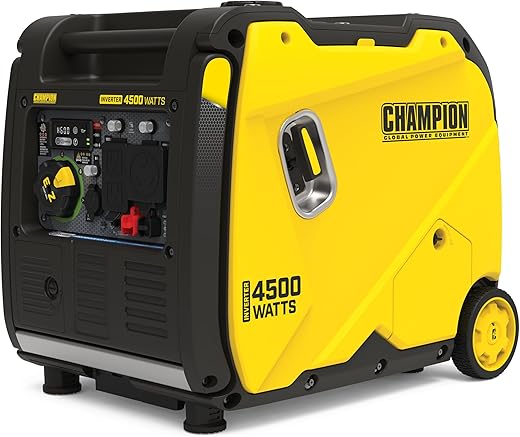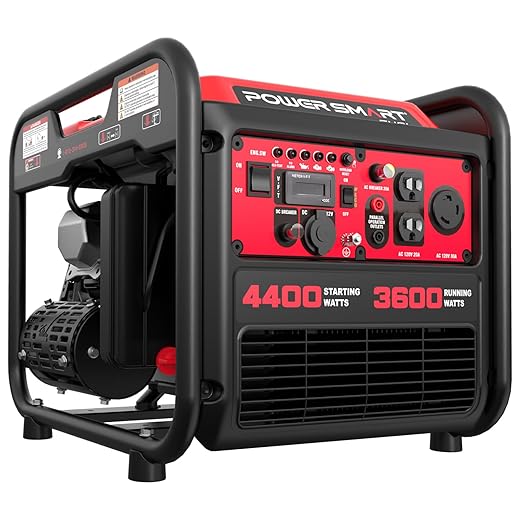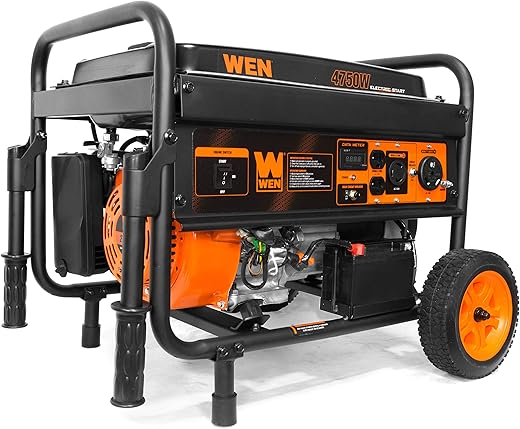As an avid RV enthusiast, I understand the importance of having a reliable power source while on the road. It can be challenging to maintain a comfortable lifestyle and enjoy your travels without electricity for essential appliances and devices. That’s why I’ve dedicated this post to exploring the best lightweight generators specifically designed for RV use. These generators combine portability with power efficiency, making them a perfect companion for anyone looking to enhance their camping or road trip experience. Join me as we review several top models, discussing their features, benefits, and key considerations to help you make an informed choice. Let’s ensure your adventures are as enjoyable and hassle-free as possible!
RV Generator Selection Guide
Why Choose a Lightweight Generator for Your RV?
When it comes to enhancing your RV experience, a lightweight generator is an invaluable asset. Choosing the right generator allows adventurers to efficiently power essential appliances without compromising fuel consumption and overall vehicle handling. In this section, we will explore the numerous benefits of lightweight generators specifically tailored for RV usage.
Portability: Easy to Take Anywhere
One of the principal advantages of lightweight generators is their portability. Weighing significantly less than traditional models, these generators allow RV owners to transport them easily without requiring extensive space or heavy lifting. For instance, the Honda EU2200i weighs only 47 pounds, which is a fraction of the weight compared to some of the larger portable generators on the market.
Key Benefits of Portability:
- Lightweight Design: Easy to lift and carry to various locations.
- Versatile Usage: Can be transported for tailgating, camping trips, or outdoor work.
- Easy Set-Up: Quick to unpack and connect without overwhelming setup time.
Ease of Storage: Make the Most of Your Space
Storage space inside an RV can be at a premium. A lightweight generator can be easily stowed away without consuming precious real estate. Models like the Westinghouse iGen4500 offer a compact design that fits comfortably in storage compartments.
Storage Solutions Include:
- Compact Dimensions: Ensuring a generator’s size falls within practical limits for RV compartments.
- Stackable Options: Some generators allow stacking, enabling efficient use of space.
- Carrying Cases: Many brands include travel-friendly bags, further simplifying storage.
Fuel Efficiency: Get More Out of Every Gallon
Fuel efficiency plays a vital role in the operational costs associated with RVing. Lightweight generators, such as the Champion 2000-Watt Portable Inverter Generator, often incorporate advanced fuel-saving technologies that provide longer runtimes on less fuel. This efficiency translates to fewer fill-ups and savings in the long run.
Benefits of Fuel Efficiency:
- Extended Runtime: Can run for hours on just a single gallon of gas.
- Cost Savings: Minimizing fuel costs during extended trips.
- Eco-Friendly Operation: Reduced emissions contribute positively to the environment.
Power Essential Appliances Without Added Weight
Lightweight generators are designed to provide enough power to run essential appliances without the extra burden of weight. With a continuous output of up to 2,200 watts, the Yamaha EF2200iS can easily support devices like refrigerators, microwaves, and lights—all while maintaining a manageable weight. This capability ensures that RVers can continue to enjoy modern conveniences.
Essential Appliances You Can Power:
- Refrigerators: Keep perishable foods fresh on long camping trips.
- Air Conditioners: Cool down your RV during hot summer days.
- Small Electronics: Charge devices and run entertainment systems without hassle.
Impact of Weight on RV Handling and Fuel Consumption
Weight has a critical influence on how an RV performs. Heavier generators can lead to compromised handling and increased fuel consumption. A lightweight generator mitigates these issues, ensuring a smoother ride and better fuel efficiency. For example, the Briggs & Stratton P2400, weighing just 54 pounds, doesn’t add excessive weight, allowing for agile maneuvering on winding roads.
Considerations Regarding Weight:
- Improved Fuel Economy: Lighter loads lead to better mileage, especially on long hauls.
- Enhanced Maneuverability: Easier steering and responsive handling when navigating tight spots.
- Reduced Wear and Tear: Less weight can minimize stress on the RV frame and components.
In summary, lightweight generators offer a harmonious blend of convenience, efficiency, and performance tailored for RV enthusiasts. By selecting the right model, RV owners can improve overall travel experiences, ensuring that every adventure is both enjoyable and functional.
Top Lightweight Generators for RVs in 2023
Finding a reliable yet lightweight generator for your RV adventures can significantly enhance your camping experience. In this section, we will delve into some of the top lightweight generator models available in 2023, highlighting their specifications, unique features, pros, and cons. This information will help you make an informed decision that suits your needs.
1. Honda EU2200i
Specifications:
- Weight: 47 lbs
- Wattage: 2200 starting watts / 1800 running watts
- Fuel Type: Gasoline
- Run Time: Up to 8.1 hours at 25% load
- Unique Features:
- Inverter technology for stable power supply
- Quiet operation at 48 dBA
- Eco-Throttle for fuel efficiency
Pros:
- Lightweight and portable
- Quiet operation, making it ideal for camping sites
- Excellent fuel efficiency with Eco-Throttle
Cons:
- Higher price point compared to competitors
- Limited power output for larger RVs
2. Yamaha EF2000iSv2
Specifications:
- Weight: 44 lbs
- Wattage: 2000 starting watts / 1600 running watts
- Fuel Type: Gasoline
- Run Time: Up to 10.5 hours at 25% load
- Unique Features:
- Smart Throttle for fuel savings
- Parallel capability to connect two generators for increased power
Pros:
- Extended runtime allows for longer usage between refills
- Lightweight design and easy to transport
- Parallel capability for future upgrades
Cons:
- Slightly lower wattage limits for power-hungry appliances
- May be noisy under load
3. Westinghouse iGen2200
Specifications:
- Weight: 46 lbs
- Wattage: 2200 starting watts / 1800 running watts
- Fuel Type: Gasoline
- Run Time: Up to 12 hours at 50% load
- Unique Features:
- Built-in USB port for charging devices
- CARB compliant for cleaner emissions
Pros:
- Long run time at medium load, perfect for extended trips
- Compact and user-friendly design
- Value for money with excellent performance
Cons:
- Slightly heavier than some competitors
- Limited customer support availability
4. Champion 100302
Specifications:
- Weight: 48 lbs
- Wattage: 2000 starting watts / 1700 running watts
- Fuel Type: Gasoline
- Run Time: Up to 11.5 hours at 25% load
- Unique Features:
- Volt Guard technology protects against overload
- Lightweight and compact design
Pros:
- Impressive run time for light camping needs
- Affordable option without compromising quality
- Easy-to-use control panel
Cons:
- Louder than some other models
- Requires regular maintenance for optimal performance
5. Generac iQ2000
Specifications:
- Weight: 46 lbs
- Wattage: 2000 starting watts / 1600 running watts
- Fuel Type: Gasoline
- Run Time: Up to 8.5 hours at 25% load
- Unique Features:
- Integrated carrying handle for added portability
- Power Dial combines start, run, and stop functions
Pros:
- User-friendly design for ease of operation
- Compact size fits easily in RV storage compartments
- Reliable performance with decent power output
Cons:
- Needs regular fueling for long trips
- Can be noisy during operation
Summary Comparison Table
| Model | Weight | Starting Watts | Running Watts | Run Time (25% Load) | Price Range |
|---|---|---|---|---|---|
| Honda EU2200i | 47 lbs | 2200 | 1800 | 8.1 hours | $$$$ |
| Yamaha EF2000iSv2 | 44 lbs | 2000 | 1600 | 10.5 hours | $$$ |
| Westinghouse iGen2200 | 46 lbs | 2200 | 1800 | 12 hours | $$ |
| Champion 100302 | 48 lbs | 2000 | 1700 | 11.5 hours | $$ |
| Generac iQ2000 | 46 lbs | 2000 | 1600 | 8.5 hours | $$ |
By understanding each generator’s specifications and unique features in this section, you can choose the one that best fits your RV lifestyle and power needs.
Key Features to Consider When Buying a Lightweight Generator for Your RV
When it comes to choosing the right lightweight generator for your RV, understanding the essential features can significantly enhance your camping experience. Below, we’ll delve into the key aspects that will help you make an informed decision.
Power Output
One of the foremost factors to consider when selecting a generator is its power output, measured in watts. The generator needs to produce enough power to sustain the appliances and devices in your RV. Items such as air conditioning units, microwaves, and refrigerators can have substantial wattage requirements.
- Example: Honda EU2200i
- Power Output: 2200 watts
- Ideal for running small to medium RV appliances, including refrigerators and TVs.
- Example: Champion 2000-Watt Inverter Generator
- Power Output: 2000 watts
- Suitable for charging electronics and running essential appliances without overwhelming your RV’s power system.
Noise Level
The ambient sound level is critical, especially in a campground setting where noise restrictions may apply. Lightweight generators can vary considerably in how loud they operate.
- Example: Yamaha EF2000iSv2
- Noise Level: 51.5 dBA at a quarter load
- Known for its quiet operation, making it perfect for peaceful camping environments.
- Example: Westinghouse iGen2200
- Noise Level: 52 dBA
- Also operates quietly while still providing ample power for RV essentials.
Fuel Efficiency
A generator’s fuel efficiency determines how long you can run your appliances before needing to refuel, which is especially important in remote locations. Look for models that maximize fuel usage to extend run time.
- Example: Honda EU3000iS
- Fuel Efficiency: Up to 20 hours at ¼ load
- This extended run time is beneficial for longer trips.
- Example: Generac GP2200i
- Fuel Efficiency: Up to 10.75 hours at 50% load
- An excellent option for short weekend trips or quick getaways without frequent refueling.
Start-up Mechanisms
Generators typically come with either manual or electric start mechanisms. Your preference may depend on how important convenience is versus the potential weight savings with a manual start.
- Manual Start: Generally lighter but may require a little more effort, suitable for budget-friendly models.
- Example: WEN 56203i
- Utilizes a manual start mechanism, providing reliability at a lower weight.
- Electric Start: Easier and more convenient, but often heavier and more expensive.
- Example: Yamaha EF3000iSEB
- Features an electric start for ease of use, making it suitable for novice users.
Safety Features
Safety is paramount when operating a generator, especially in enclosed spaces. Look for models that have built-in safety features.
- Carbon Monoxide Detector: Some generators come equipped with this vital feature that automatically shuts down the unit if it detects elevated CO levels.
- Example: DuroMax XP2000iS
- Equipped with safety features to prevent carbon monoxide build-up.
- Low Oil Shut Off: This feature protects the engine from damage due to low oil levels.
- Example: Champion 3100-Watt Dual Fuel Generator
- Offers low oil shut off, ensuring the generator runs safely and efficiently.
Maintenance Requirements
Maintenance is often overlooked but vital to ensure longevity and performance. Always check how much upkeep a generator requires, including oil changes, air filter services, and spark plug replacements.
- Example: Generac GP3500iO
- Requires regular oil changes and filter replacements, but comes with a comprehensive manual outlining the intervals.
Warranty Options
Finally, consider warranty options that manufacturers provide. A robust warranty can offer peace of mind should any issues arise during the generator’s lifecycle.
- Example:
- Honda EU2200i offers a 3-year residential warranty, a testament to its durability and reliability.
- Example:
- Westinghouse iGen4500 comes with a 3-year warranty and lifetime technical support.
By examining these features — power output, noise levels, fuel efficiency, start-up mechanisms, safety features, maintenance requirements, and warranty options — you will be better equipped to choose a lightweight generator that suits your RV needs and enhances your travel experience.
User Experiences and Testimonials
In this section, we delve into real user experiences and testimonials regarding the generators discussed previously—specifically, the Honda EU2200i, Yamaha EF2200iS, and Westinghouse iGen4500. By sharing actual feedback from consumers, we aim to provide insights into how these generators perform in practical situations, their reliability, and overall user satisfaction.
Honda EU2200i: Performance and Reliability
The Honda EU2200i is frequently lauded for its lightweight design and exceptional performance. Users appreciate its ability to handle various tasks, from powering tools on a construction site to providing backup electricity for camping trips.
Key User Feedback:
- Power Output: Many users report that the Honda EU2200i starts effortlessly and powers appliances smoothly.
- Testimonial: “I used it to power my refrigerator for several hours during a power outage, and it didn’t miss a beat.”
- Portability: Weighing just 47 pounds, portability is a significant bonus. Users love its compact size.
- Testimonial: “I can easily lift it into my car for weekend getaways; it’s a lifesaver during camping.”
- Noise Level: The generator operates at a mere 48 dBA, making it quieter than a normal conversation.
- Testimonial: “I can’t believe how quiet it is! I ran it at night without waking anyone in the house.”
Common Issues:
- Price: Some users find it pricier compared to other models.
- Resolution: Many users justify the cost by citing its longevity and performance reliability over time.
Yamaha EF2200iS: Innovative Design and Efficiency
The Yamaha EF2200iS stands out for its blend of technology and user-friendliness. Users appreciate its smart throttle feature and built-in fuel gauge.
Key User Feedback:
- Eco Mode: Many praise the eco mode for extending fuel efficiency.
- Testimonial: “I ran it for over eight hours on eco mode, and it barely used any fuel!”
- Electric Start: Users have highlighted the convenience of the electric start feature.
- Testimonial: “No need to pull a cord—one press of the button, and it’s on.”
Common Issues:
- Weight: At 55 pounds, some users find it slightly heavier to transport than expected.
- Resolution: However, many duo users with a dolly or portable cart to help with transportation.
Westinghouse iGen4500: High-capacity and Versatile
The Westinghouse iGen4500 is popular among users who require substantial power for longer periods. Its advanced features and versatility appeal to a wide audience.
Key User Feedback:
- Dual Fuel Capability: Users love the flexibility of running it on either gasoline or propane.
- Testimonial: “Switching fuels is easy; propane lasts longer, which has saved me money on fuel costs.”
- LCD Display: The generator’s LCD display allows for easy monitoring of power output, fuel level, and remaining run time.
- Testimonial: “I appreciate that I can see exactly how much power I’m using. It gives me peace of mind.”
Common Issues:
- Volume: While many find it relatively quiet, some users do note that it can be louder than they expect when running at full load.
- Resolution: Users suggest using it outdoors or in areas with adequate distance to mitigate noise concerns.
Comparison Table
Here’s a quick comparison of user experiences with these three models:
| Feature | Honda EU2200i | Yamaha EF2200iS | Westinghouse iGen4500 |
|---|---|---|---|
| Weight | 47 lbs | 55 lbs | 120 lbs |
| Noise Level | 48 dBA | 57 dBA | 52 dBA |
| Power Output | 2200 watts (2500 surge) | 2200 watts (2500 surge) | 4500 watts (4800 surge) |
| Fuel Types | Gasoline | Gasoline | Dual Fuel (Gas & Propane) |
| Electric Start | No | Yes | Yes |
| Eco Mode | Yes | Yes | Yes |
Summation of Experiences
As presented through the various testimonials, each generator holds its own unique advantages and potential drawbacks. The Honda EU2200i stands out for its compact and quiet operation, while the Yamaha EF2200iS impresses with its electric start and efficiency. On the other hand, the Westinghouse iGen4500 impresses users with its high capacity and dual fuel capabilities, making it an ideal choice for those needing flexibility in power options. Each user experience brings invaluable insights that can help potential buyers make informed decisions based on their specific needs and preferences.
Powering Your Adventures with Ease and Efficiency
In conclusion, my exploration of the best lightweight generators for RVs has highlighted various options that cater to different needs and preferences. By examining their features and user experiences, I hope to have provided you with valuable insights. As you make your decision, remember to prioritize factors like power requirements, portability, and customer feedback to find the ideal generator that will enhance your RV adventures. Happy travels!












Great article! I didn’t even know some of these brands existed! Time to do some shopping!
Anyone have experience with the Honda EU2200i? I’ve heard mixed reviews but still eyeing it!
Thanks for the recommendations! I’ve been hunting for a lightweight generator for my RV trips.
Love that you considered noise levels! Quiet generators make such a difference when camping!
Did you test any of these models yourself? I’m curious about their real-life performance.